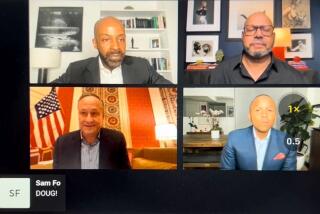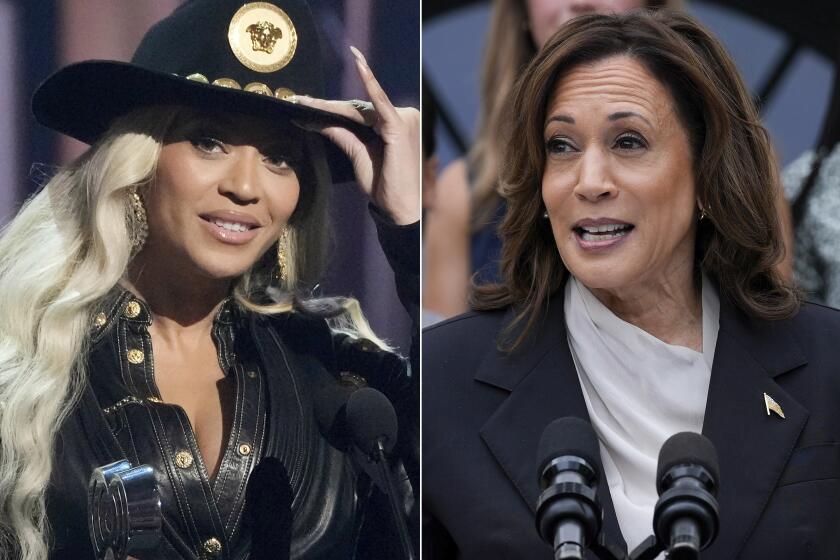BOOK MARK : Americans Ask Much of Politics, Then Hate the Results
If any one issue is obstructing the formation of a center ground in American politics, it is abortion. On its face,abortion is as uncompromisable an issue as the American political system has ever confronted. For advocates of choice, abortion is a fundamental right. For the pro-life movement, abortion is murder. Between those two positions there is little room for agreement--and, in fact, the dialogue between the pro-choice and pro-life movements is almost nonexistent.
Yet the mass electorate sees the issue quite differently from the partisans on either side. There is no single majority on abortion in the country; there are two overlapping majorities.
On the one hand, Americans are deeply uneasy with government interference in intimate decisions. Thus, when pollsters pose the abortion issue as a question of whether the choices of individual women or government policy will be binding, the results are a clear pro-choice majority.
Yet when pollsters put the question differently, they get another majority: Most of the country thinks too many abortions are performed, rejects most reasons women give for having them and favors certain restrictions on abortion--such as requiring teen-agers to get parental permission.
Some polls have produced the rather staggering finding that a majority can support legal abortion, even as a majority of the same group considers abortion the equivalent of murder.
This mass ambivalence makes itself felt at the polls in a peculiar way. Many voters simply refuse to base their vote on the abortion issue. Thus in Iowa, in 1990, Sen. Tom Harkin, running on a pro-choice platform, was reelected, and so was Gov. Terry E. Branstad, an ardent right-to-lifer. In 1990, voters handed pro-choice candidates the governorships of Florida and Texas--and pro-life candidates the governorships of Michigan and Ohio.
The 1990 elections, once touted as the nation’s abortion referendum, turned out to be something far less. An ambivalent country cast an ambivalent vote.
If ever there were an issue where ambivalence is understandable, it is abortion. The challenge to U.S. politics is to find ways of promoting public policy that speaks to that ambivalence. The problem for the right-to-life movements is that the country as a whole does not accept its absolutist opposition to abortion and is wary of too much government meddling. The problem for the pro-choice movement is that the country shares the right-to-lifers’ moral uneasiness with abortion and would like to encourage a moral standard that would reduce the number of abortions.
For the rather long short-run, the right-to-live movement needs to accept that its primary task is not political but moral: It needs to convince the country that its view of abortion is morally compelling.
Even if the right-to-lifers succeeded in their goal of banning all abortions, large numbers of women would continue to seek and get them illegally. Indeed, the polls suggest that younger women are far more pro-choice than the rest of the female population, suggesting that the moral trends may be moving away from the right-to-life movement.
Accepting that abortion will remain largely legal indefinitely is not a happy prospect for the right-to-life movement. But the pro-choice movement could ease the way toward compromise by accepting that “choice” is not the end of the story, but only the beginning.
As Daniel Callahan, a philosopher who supports abortion rights, has argued, “The pro-choice movement has tried to make do with a thin, near-to-vanishing idea of personal morality.” This, he argues, “serves neither its own long-term interests nor those of the pluralistic proposition.”
Thus, on a broad range of issues, from promoting adoption to making it easier for women who want to give birth to do so, there is a broad arena for compromise and cooperation. Also helpful, as Callahan argues, would be “a significant improvement in maternal and child benefits, improved counseling and more effective family planning and contraceptive education and services.”
Further, accepting restrictions on late abortions except where a mother’s life is endangered--there are, in any event, few of these--would speak powerfully to the country’s uneasiness with abortion. So, too, would parental-notification laws with real escape clauses for teen-age girls who have reason to fear the reactions of their parents.
The truth, as Callahan argues, is that abortion is about more than choice. It is, he says, “also about the welfare of families and children, about the obligation of males toward women and toward the children they procreate and about the family and the place of childbearing within it.” Americans are ambivalent about abortion because they take exactly this sort of complex view.
What I am suggesting will surely not satisfy the right-to-life movement, since my approach assumes that abortion will remain largely legal. It is understandable that from the right-to-lifers’ ethical point of view, tolerating abortion for a fixed period is like tolerating slavery for a few more years. And many pro-choice advocates will resist even the suggestion that abortion should be restricted or discouraged. They see this as a threat to a right they cherish.
But the abortion issue could provide us with a powerful example of how to deal politically with a complex moral question. The debate the country most needs on abortion is not political but ethical. The question is as unsettled as it is unsettling, and the political system is never likely to settle the matter entirely.
For three decades, we have loaded up the political system with moral debates and cast political foes as moral lepers. The result, judging from the popular revulsion with politics, has not been satisfactory. A genuinely moral politics cannot be narrow and moralistic.
The mass of voters understand that complex moral questions do not get settled easily. They accept that both the right-to-life and pro-choice movements are animated by people of good will. Many individuals agree with arguments made by both sides.
The lesson here goes beyond the abortion issue: If we are to end the cultural civil war that has so distorted U.S. politics, we need to begin to practice a certain charity and understanding. We need politics to deal with the things it is good at dealing with--the practical matters like schools and roads, education and jobs.
Paradoxically, by expecting politics to settle too many issues, we have diminished the possibilities of politics. After years of battling about culture and morality through the political system, voters are looking for a settlement that combines tolerance with a basic commitment to the values of family and work, compassion and the rule of law.
Americans welcomed many of the liberating aspects of the ‘60s. They also welcomed the rediscovery during the ‘80s that certain “traditional” rules and values were socially useful and even necessary. In the 1990s, we have a choice: We can join the old battles all over again and set the ‘60s against the ‘80s. Or we can try to move on.
1991 by E.J. Dionne Jr. Reprinted with permission from Simon & Schuster, Inc.
BOOK REVIEW: “Why Americans Hate Politics,” by E.J. Dionne, Jr., is reviewed on Page 3 of today’s Book Review section.
More to Read
Get the L.A. Times Politics newsletter
Deeply reported insights into legislation, politics and policy from Sacramento, Washington and beyond. In your inbox three times per week.
You may occasionally receive promotional content from the Los Angeles Times.






